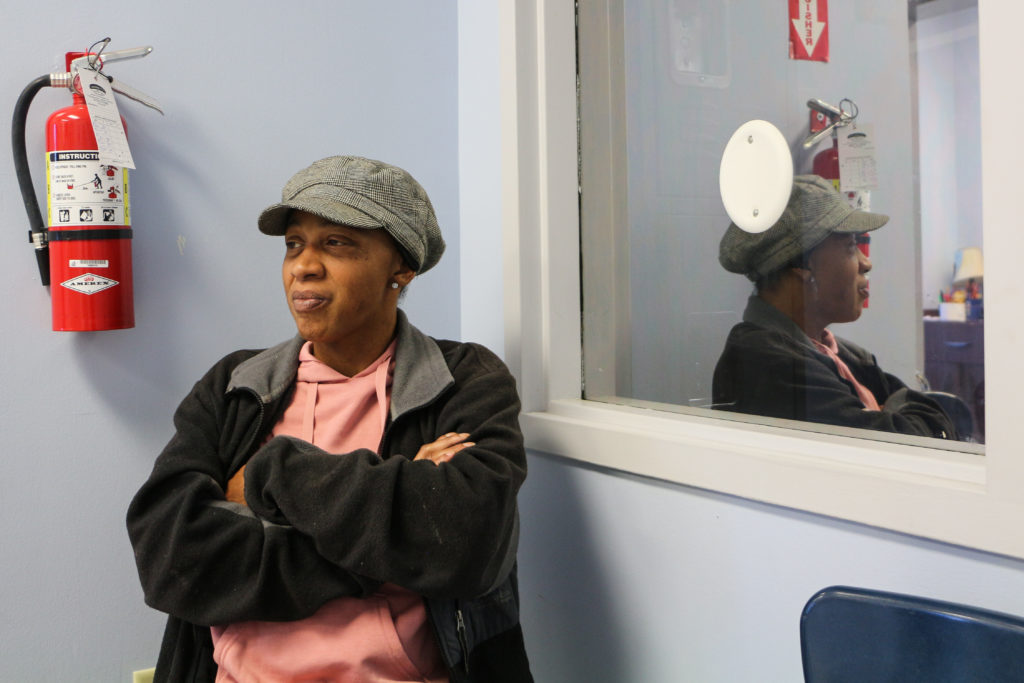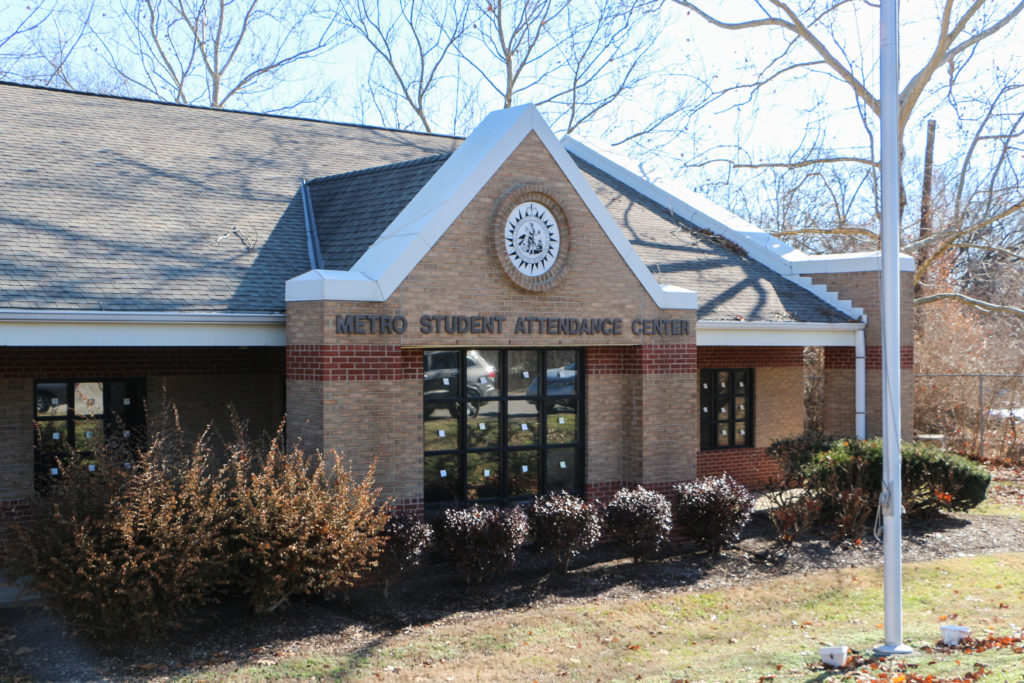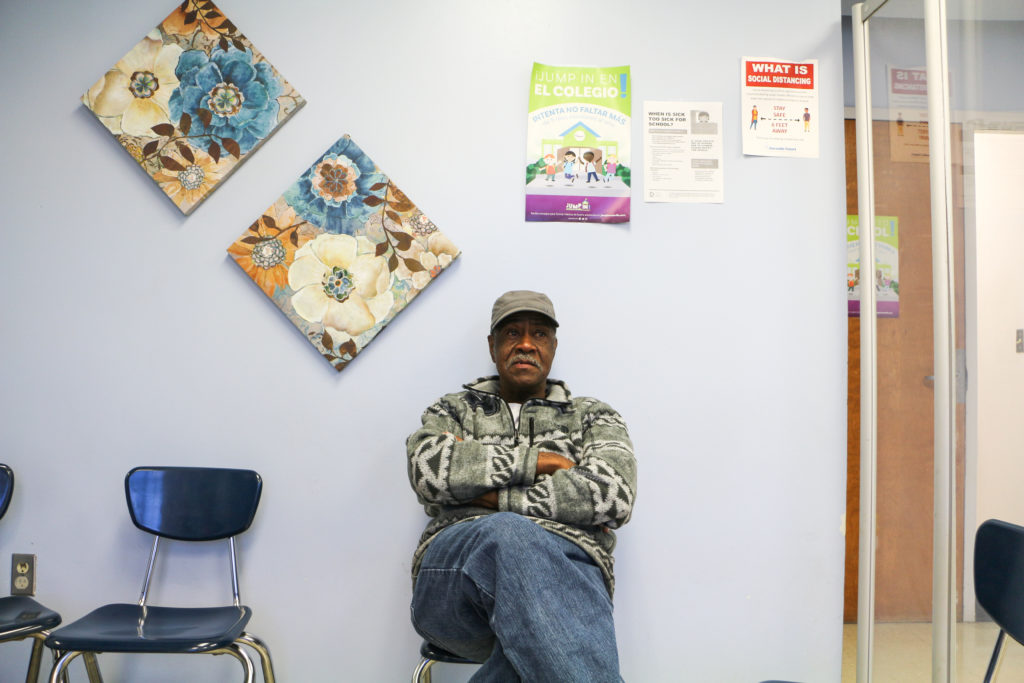
14-year-old Kendra Pruitt cradles her cell phone to her ear as she tries to find a quiet place to talk in her foster home two hours away from Nashville in Jackson, Tenn.
“The other foster kids just got back in the house,” she says, “so I have to come in the bathroom.”
The muffled sounds of children carry through the receiver. It’s nearly impossible for Kendra to get a moment alone. She’s living with five other kids, including a baby named “Juju,” who keeps interrupting Kendra while she’s talking.
She says sometimes she feels more like a babysitter than a child herself. That’s not the only problem she has with this foster home.
“You can’t flush toilet paper down the toilet,” she says. “There’s, like, a stinky smell in the bathroom because there’s a big old trash can that you’re supposed to put the toilet paper in.”
There’s mold in the cabinets, she says, and she’s even found cat feces in her bed. When she asks for help with her homework, she says her foster parent tells her to pray about it.
“I don’t mind praying, but, like, when it comes to schoolwork, I’mma need help,” she says. “But they don’t want to help.”
Like a lot of kids in the care of the Tennessee Department of Children’s Services, this is not Kendra’s first foster home. It’s her third.
She’s contending with a system that has been in the news nonstop for failures inside the agency. There’s a case worker shortage, a lack of foster placements and kids sleeping on the floors of office buildings. All of this is happening as a record number of children are heading into the system, straining it even further.
More: Inside Tennessee’s Department of Children’s Services
Kendra’s case provides a small window into how some of the agency’s challenges impact the children and family it is tasked with serving.
‘A never-ending cycle’
Kendra’s journey with the system started in 2020 when Javon Pruitt, Kendra’s mom, was in and out of the hospital after having amputations because of her diabetes.
“It was hard for me to get my kids up and get them ready for school,” Javon says. “I was so broke down and sick.”
Kendra really loves her mom. She wanted to stay home and take care of her. That’s what caught DCS’s attention.
It started with the school. Nashville Metro Public Schools flags a student and tries to intervene after four unexcused absences. Five unexcused absences? That can result in a referral to juvenile court. If there’s additional absences, the court has the power to take the kid from their home.
That’s exactly what happened to Kendra.
“It really hurt me ’cause I was like, ‘Do these people not realize (that) I’ve been sending notes and trying to talk to the social worker and telling them that what was going on?'” Javon says. “And we went in court, and basically, that’s when they took my rights as a mother and was saying that my kids was like state property.”
Like with most DCS cases, this is only one half of the story. The other half is in the state’s hands, and DCS did not respond to WPLN’s request for comment.
But, whatever the reasons — and there were likely multiple — Kendra and her younger brother, Junior, got sucked up into the system.
“I completely went numb,” Kendra says softly. “I just, like, remember I just didn’t want to be away from my mom.”
Since then, “it’s been a never-ending cycle,” says Javon.
‘My hands were tied’
For their first foster home, Kendra and Junior were placed with a family friend they had never met.
“It was kind of like a stranger,” Kendra recalls. “Her house was kind of like a hoarder’s house.”
The second home was even worse.
“The whole house just treated us like we were … nobody really,” she says, tearfully.
Kendra has been through a lot, but when she talks about this foster placement, in particular, her voice trembles. The foster parent would take away their phones, Kendra says, and kick them off the WiFi — disconnecting them from their mom and even their homework.
Kendra says she tried to tell the DCS workers.
“I couldn’t really tell them much either because they would always go back to the foster mom, and then the foster mom would get mad at me,” Kendra says. “She used to call me, like, all types of names, like a manipulator and just different stuff to bring me down. She’d make it where, like, I feel like I’m not supposed to cry or have feelings.”
 Paige Pfleger WPLN News
Paige Pfleger WPLN NewsJavon Pruitt holds up her wallet, before a hearing to see if her daughter Kendra might be released from DCS custody.
Things went on like this for a long time. Eventually, nine months after their first placement, the kids got to go home to their mom.
But their journey was far from over. The family was officially on DCS’s radar. A few slip ups could land the kids back in the state’s custody.
Kendra felt a lot of pressure.
“I was doing everything that I could, you know, so I could stay home,” she says.
The family had a quiet year, but then, in November 2022, Kendra says she was sexually assaulted by a boy at school.
“I couldn’t really tell people about it because I was scared to even talk up about it,” she says. “And I kind of kept it in, and it just made me lose my self-esteem and stuff and made it where I just wanted to stay in bed all day.”
Javon says she didn’t know what was wrong.
“She was having problems getting up, going to school, and I didn’t know what was going on,” Javon says. “But to find out this was what it was, she had been assaulted. She didn’t want to go to school, which was understandable. And I wouldn’t want her to go to school going through that either.”
What happened next is pretty unbelievable.
 Courtesy of Kendra Pruitt
Courtesy of Kendra Pruitt A screenshot of a text conversation between 14-year-old Kendra Pruitt and a DCS worker.
Kendra — a 14-year-old girl trying her hardest to stay with her family — was told through a text message from a DCS worker that she was going to be placed in foster care again.
“And I was just confused,” Kendra says. “I asked a lot of questions, but she wasn’t really telling me anything. So I was lost and confused and angry.”
Kendra was in first period at school when she got the text. Her mom, Javon, was at home, and she had no idea.
“They didn’t even call and let me know that they were trying to get her back into custody or what was going on,” Javon says. “I knew nothing about DCS coming to pick her up because we had just had a meeting that Wednesday, and they said that they recommend, you know, her to stay at home. And I thought that’s what they were gonna do.”
A screenshot of the texts says that a “higher up made the call.” DCS did not respond to WPLN’s questions about the text messages.
In December, Kendra was taken to that foster home in Jackson.
“It was just like my hands were tied,” Javon says. “And I can’t do anything for my kids … like, I wasn’t even the parent, basically. So that took a lot out of me. I’m like, ‘What mother would let somebody come in and take their kids?’ You know what I’m saying? So that was really stressful.”
‘Kids lives at stake’
In early January, Javon and her dad, Wayman, arrive at the Metro Student Attendance Center, which is part of the Davidson County Juvenile Court.
“They just said they were here for review of the case,” Javon says. “But I’m praying they can just let (Kendra) come home and get back in their normal school.”

The family had been looking forward to the hearing. They thought Kendra would be brought back to Nashville, at least for the hearing, or maybe, for good.
But a DCS worker tells them Kendra won’t be joining them in person today and will call in from her school in Jackson.
“I wish … I thought maybe she’d have been here,” Kendra’s grandpa Wayman says, as he wipes tears from his eyes.
Wayman has been having a hard time himself. He’s been in and out of homelessness for years now. Still, he made sure to be here today.
“I’ll sleep in a car, wherever I got to sleep at. I’ll find somewhere, you know? That ain’t no big problem. No,” he says. “Taking the kids out of your life is the biggest problem.”
He can deal with being homeless, but he can’t deal with this.
Time passes slowly, the way it does inside government buildings. The magistrate is running late.
Javon starts talking about her home life in a metro housing complex in South Nashville. She knows it’s not the best for her kids. To get out, she would need help, and she’s been having trouble getting that lately.
“The environment that they growing up in is, like, super bad,” she says. “If we could get out of the environment that we’re in, that would help out a whole lot.”
She says her kids have seen things there she wishes they hadn’t, like most recently with Junior.
“He’s seen a dead body … Just laying in the yard, you know, the guy just got shot,” Javon says. “So (Junior) ran home and … it really made him not want to go out there for a while. He stayed in the house for about three or four months.”

Wayman Wiley, Kendra’s grandpa, waits for a hearing at the Metro Student Attendance Center.
She pauses, reflecting on what else might help her family.
“We need family counseling,” she says.
She says they’ve been trying to get that from DCS, but they’re still waiting.
“I know DCS is backed up,” Javon says carefully, “but we got to think about these are people, kids’ lives, that’s at stake right here.”
‘A lot of mess’
About an hour after the family’s scheduled hearing time, the magistrate is ready for them.
Only family is allowed inside the hearing since Kendra is in the DCS system as a dependent and neglected child.
Another hour or so passes before Wayman rushes back into the waiting room.
“It’s chaos,” he says. “The judge didn’t know what was going on himself.”
After all the waiting and anticipation, Javon finds out that Kendra will be staying in Jackson for who knows how long.
And she receives another blow. DCS says they want to take Junior, too.
“Now they’re trying to see about getting my son,” Javon says slowly. She seems shocked, confused. “It’s a lot of mess going on … A lot of mess.”
A lot of mess, and no idea of when, exactly, it might get cleared up. The family is just staring down a long road full of more hearings, more anger and more confusion — with no end in sight.
Listen to our This Is Nashville episode about Tennessee’s Department of Children’s Services here.


